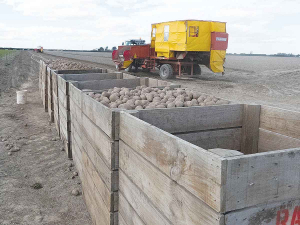Potato growers eye innovation, growth
OPINION: As we look back on the past year, I am proud to reflect on the remarkable progress and achievements that have defined our success.
 NZ potato growers want duties imposed on frozen potato imports coming in from Belgium and the Netherlands.
NZ potato growers want duties imposed on frozen potato imports coming in from Belgium and the Netherlands.
New Zealand potato growers want duties imposed on frozen potato imports coming into the country from Belgium and the Netherlands.
Growers’ organisation Potatoes NZ (PNZ) has applied to the Ministry of Business, Innovation & Employment to consider the anti-dumping move, claiming a ‘real threat of material injury’ to the New Zealand potato industry. It believes the situation has arisen due to the Covid-19 global pandemic causing supply chain disruption in hospitality industries worldwide.
“The threat is a result of huge surplus inventories of frozen potato products and processing potatoes in Belgium and the Netherlands,” PNZ claims.
“The surpluses, combined with the support the European industries are receiving from their governments, will drive export prices down further, increasing dumping margins and threaten the New Zealand industry.”
According to its own analysis, PNZ claims current ‘dumping margins’ are anywhere between 95% to 151%.
“We expect these margins to increase. This will lead to price undercutting for the NZ products of between 18% and 38%. The damage this will cause will destroy the NZ industry,” it claims.
Meanwhile, a recent report commissioned by PNZ – ‘Economic and Community Impact Report’ – by researchers BERL, claims that in the absence of a duty, potato processors would be forced to cut production and demand for potatoes from NZ growers would drop.
“Inevitably, this would lead to a loss of employment and a threat to the viability of some potato growing businesses.
“The imposition of an anti-dumping duty on dumped imports of frozen potato products, would help to maintain demand for New Zealand grown potatoes, and ensure the continuity of employment and business in the growing sector,” it claims.
“A duty would mean that the potato growers would experience the same market conditions, including competition between themselves and fluctuations in market prices, as they did before the dumping occurred.”
Fonterra’s impending exit from the Australian dairy industry is a major event but the story doesn’t change too much for farmers.
Expect greater collaboration between Massey University’s school of Agriculture and Environment and Ireland’s leading agriculture university, the University College of Dublin (UCD), in the future.
A partnership between Torere Macadamias Ltd and the Riddet Institute aims to unlock value from macadamia nuts while growing the next generation of Māori agribusiness researchers.
A new partnership between Dairy Women’s Network (DWN) and NZAgbiz aims to make evidence-based calf rearing practices accessible to all farm teams.
Despite some trying circumstances recently, the cherry season looks set to emerge on top of things.
Changed logos on shirts otherwise it will be business as usual when Fonterra’s consumer and related businesses are expected to change hands next month.

OPINION: Here w go: the election date is set for November 7 and the politicians are out of the gate…
OPINION: ECan data was released a few days ago showing Canterbury farmers have made “giant strides on environmental performance”.